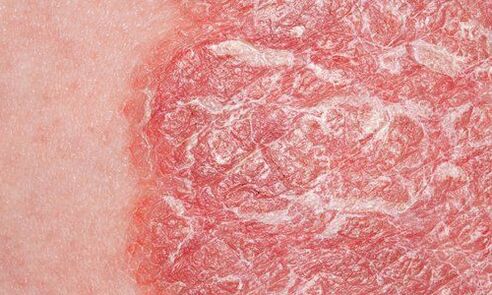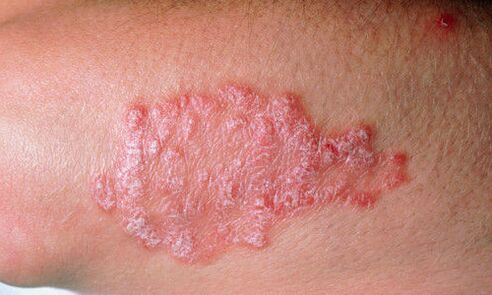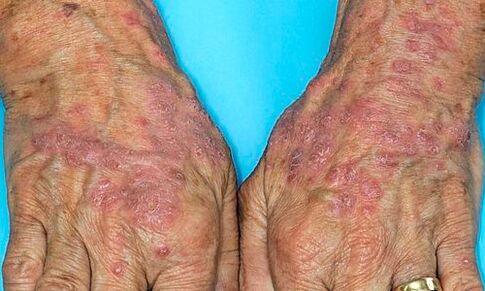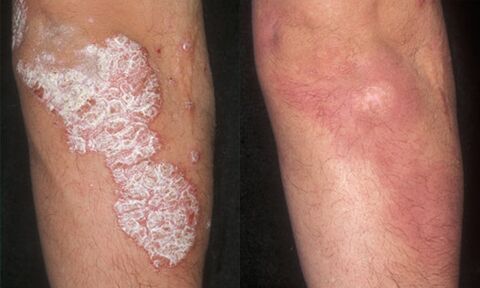Skin diseases are inherently uncomfortable. And if even long-term systematic treatment does not guarantee a positive result, then the situation becomes a real problem.
Psoriasis (squamous cellworm) is a disease with a "rich" millennial history. Despite the confirmed difficult-to-treat nature of the disease, all appear ready to join the cure.
Announcements of sensational drugs are replete with every step that promises to eradicate the disease, miracle devices and "cutting edge technologies, " healers and internet forums. Doctors-dermatologists also do not sleep and do everything possible, study and test new drugs, but they do not promise miracles through treatment.
What is psoriasis?
Psoriasis is known as dermatosis. In this chronic, non-contagious disease, skin cells divide 28 times faster than normal. The cells do not have time to fully mature, their intercellular communication is disturbed, which leads to thickening of the upper layers of the skin and the formation of pronounced flaking and plaques.
In the course of the disease, the cells of the immune system attack the skin's own cells, so that the process is accompanied by chronic autoimmune inflammation. The large foci formed are able to form their own capillary-riddled blood vessels within themselves.



The causes of psoriasis. Can you get infected?
The course and course of psoriasis was first described by the English doctor Robert Willen at the beginning of the 19th century. The disease was finally differentiated from leprosy, its non-infectious nature and thus the impossibility of infection from another person proved. From that moment on, active research began that has not stopped to this day. But unfortunately without much result. . .
There are many versions of the onset of the disease, the most important of which is of hereditary nature, but which has not been definitively confirmed. It is known that psoriasis can appear at any age, and in recent years it has become noticeably "younger" and is recorded even in newborns.
Psoriasis symptoms
There are different types of psoriasis. The main cause - plaque (or common) psoriasis - is found in 80 percent of patients. It is characterized by the appearance of small scaly spots that grow and merge into large spots - psoriatic plaques. Their surface is covered with silvery-white scales that easily come off the skin when you brush.
Plaques can be on any part of the body - on the legs, back, shoulders, scalp and face, but initially appear in places subject to one or the other friction: on the elbows, waist (from the pressure of the belt and clothing), in places with pressure-resistant underwear. During an exacerbation, the plaques grow and gradually spread in different directions. The process is usually systemic and takes place once or twice a year.
Periods of deterioration are associated with
- general weakening of the immune system,
- emphasize,
- Nutritional disorders and
- other reasons (cosmetics, unusual drink or food).
If left untreated, common psoriasis can have unpleasant consequences such as nail psoriasis, tear psoriasis and exudative psoriasis, psoriatic arthritis, etc.
How to cure psoriasis
The first attempts to treat psoriasis were made in Ancient Greece when they discovered the beneficial effects of sunlight on the condition of the skin. Ancient doctors also used a mixture of oils and fatty acids, the remains of which have been found near burials. In the Middle Ages, psoriasis was considered the "seal of the devil" and a kind of leprosy: In the leper colony, people were isolated from society, which led to a sad outcome.
Currently, the following concept has been formed: the patient requires mandatory observation by a dermatologist and systematic treatment, including taking B vitamins, calcium gluconate, nicotinic acid, antihistamines and anti-inflammatory drugs. Medicines are used to cleanse the liver, which plays an important role in the condition of the skin.
Appointments are strictly individual, taking concomitant illnesses into account. An important role is played by the external treatment of psoriasis, the purpose of which is to drown out the superficial process. Salicylic ointment is used in combination with hormonal agents, a new drug has recently been successfully tested - an ointment, an analog of vitamin D. The latter is produced in the skin under the influence of sunlight, but its deficiency is one of the causes of pathological processes in psoriasis.

The ointment does not fundamentally solve the problem, but noticeably improves the condition of the skin, alleviates peeling and eases the course of the disease without the side effects that hormone ointments are so rich in. Patients are advised to use moisturizing body creams, diet and vitamins, and annual spa treatments on a daily basis. Timely and regular therapy allows you to achieve a period of remission, that is, drown out the manifestation of the disease for a long time.
The original method of treating psoriasis is to use garra rufa fish, which eat away psoriatic plaques on the skin without touching healthy areas. For the first time fish was used in the Kangal Thermal Bath (Turkey), but later in a number of clinics and beauty salons.
An alternative view of psoriasis treatment
Many people with psoriasis are exposed to stress and negative attitudes towards their environment, which make the disease worse. For those who have been able to develop a positive attitude towards the disease and have learned to live with it, it is much easier to prevent an exacerbation in time with adequate treatment. They are supported by a number of researchers who call for the disease to be viewed only as a gift from nature.
It has been found that psoriasis patients look ten years younger than their peers, and their bodies deal with wounds and internal illnesses much faster than normal people. The increased cell proliferation, which is to blame for the pathological process, plays a positive role in the healing stages.
The skin is protected from radiation and ultraviolet radiation by a high proportion of antioxidants, so that people can spend hours in the sun without worrying about overdosing. In addition, they are protected against cancer, as defective, diseased cells quickly die and are replaced by healthy ones.
According to the biophysicist, the author of the most optimistic theory, psoriasis is a long-term experiment of nature. In his opinion, psoriasis patients are carriers of mankind's golden gene pool, which prepares nature for future human survival under extreme conditions. After all, the health status of those whose cells are born and die extremely quickly are resistant to many negative factors.
Be that as it may, psoriasis is not a cause of depression and restriction of social activity. It is entirely possible to "agree" with it, all you need to do is pay a little more attention to your health and the condition of your own skin. In addition, participation in a world-scale experiment is an obligation.

























